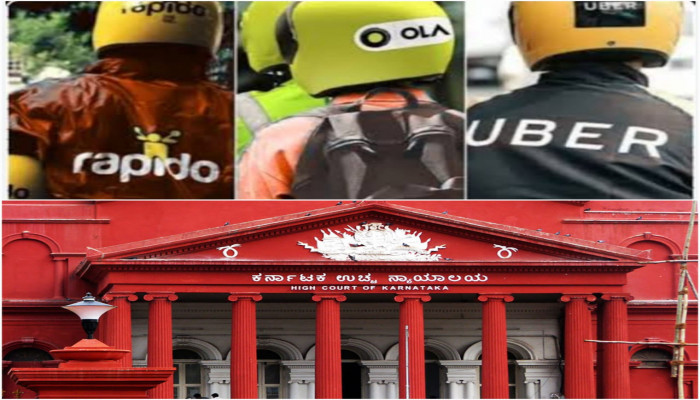Karnataka High Court bans bike taxis, gives government six weeks to enforce shutdown
- In Reports
- 03:26 PM, Apr 03, 2025
- Myind Staff
On Wednesday, the Karnataka High Court dealt a significant blow to bike taxi aggregator apps, such as Rapido, ruling that they cannot operate in the state without obtaining government-approved guidelines and rules under Section 3 of the Motor Vehicles Act, 1988, with other necessary procedures. The court has given the state government and transport department six weeks to shut down all bike taxi operations. Justice B M Shyam Prasad has ordered bike taxi services like Rapido, Uber, and Ola to cease operations within a specified timeframe. Meanwhile, the state government has been given a three-month deadline to establish the necessary rules and guidelines for bike taxi operations.
While reading the order, Justice Prasad stressed, “The transport department cannot be directed to register motorcycles as transport vehicles or issue contract carriage permits for such services until appropriate government regulations are in place.”
Talking to the media house The Indian Express, state Transport Minister Ramalinga Reddy conveyed, “We will review the certified copy in detail. We will wait (before taking any action) as the court has granted six weeks’ time for the aggregators to cease operations. The court has also given time to the state government to frame appropriate guidelines for bike taxi operations. We will work on it accordingly.”
A spokesperson from Rapido voiced concern about the bike and taxi riders working for them. “The Hon’ble High Court of Karnataka has directed aggregators to cease operations of bike taxis after six weeks and accordingly directed the State Transport Department not to take any adverse action within such time. Karnataka-born Rapido is concerned about the welfare of lakhs of bike-taxi captains onboarded on the platform and will evaluate and pursue appropriate legal remedies once the detailed order is made available,” stated the spokesperson.
During the hearing, Senior Advocate Arun Kumar, representing one of the parties, pointed out that Ola only started its bike taxi services in April 2024. While the court acknowledged this, it ruled that all petitioners must follow the directive and stop their bike taxi operations. The judgment also referred to a 2019 expert committee report that studied the effects of bike taxis on traffic and safety. The court emphasised the need for clear regulations before such services can continue.
Roppen Transportation Services Limited, the parent company of Rapido, launched its bike taxi services in Karnataka around 2016, leveraging the growing demand for fast and affordable transportation. However, the state’s Transport Department declared these services illegal, stating that private two-wheelers with white number plates cannot be used commercially under the Karnataka Motor Vehicle Rules. As a result, authorities carried out several crackdowns, seizing over 200 bikes in February 2019 and another 120 in January 2022. These actions were driven by protests from autorickshaw and cab unions, who argued that bike taxis threatened their livelihoods. Rapido approached the Karnataka High Court, requesting that the state government refrain from interfering in its operations and permit two-wheelers to be registered as transport vehicles with the necessary permits under the Motor Vehicles Act, 1988.
In July 2021, the Karnataka government introduced the Electric Bike Taxi Scheme, which permitted bike taxis but limited them to electric vehicles (EVs) as part of a push for sustainable transport. A month later, in August 2021, the high court issued an interim order controlling authorities from taking action against Rapido’s bike taxis while the case was still under review.
Tensions escalated as autorickshaw unions clashed with bike taxi riders, resulting in violent incidents. In April 2024, the Karnataka High Court, responding to a petition from the Bike Taxi Welfare Association, directed the state to ensure that bike taxi operators were not harassed by autorickshaw drivers, reaffirming their right to operate under the 2021 interim protection. However, in March 2024, the state government scrapped the Electric Bike Taxi Scheme, citing misuse, where non-electric bikes were being used, and raising safety concerns, especially for women. Despite this, Rapido continued its operations, citing protection under the high court’s ruling.
On November 12, 2024, the Karnataka High Court reserved its judgment on Rapido’s plea to register two-wheelers as transport vehicles and grant permits under the Motor Vehicles Act. The state opposed the plea, arguing that bikes with private registration plates violate regulations and lack proper safety measures. Rapido, on the other hand, defended its services, stating that it provides over 20 lakh rides per week and supports 10 lakh riders.
Beyond Karnataka, Rapido is also encountering legal hurdles in Maharashtra, Delhi, and Assam, where state governments have primarily banned bike taxi services for operating without a commercial license or permit.
Satya Arikutharam, an urban mobility expert, argued that bike taxis are intrinsically dangerous and inappropriate for public transport. He stated, “The state government should now regulate autorickshaws and allow shared auto services as a viable alternative. We hope aggregators respect the state’s right to frame policies and refrain from engaging in legal battles, allowing the status quo to continue.”
Rudramurthy, general secretary of the Auto Rickshaw Drivers’ Union (ARDU), stated, “This is definitely a welcome move and a big relief to autorickshaw drivers. However, as auto drivers, it is time that we adhere to the state government’s norms and charge passengers fairly. A lot of auto drivers still charge excess fare and would refuse rides. The auto drivers should work collectively and ensure that we provide fair and reasonable services to passengers.”







Comments